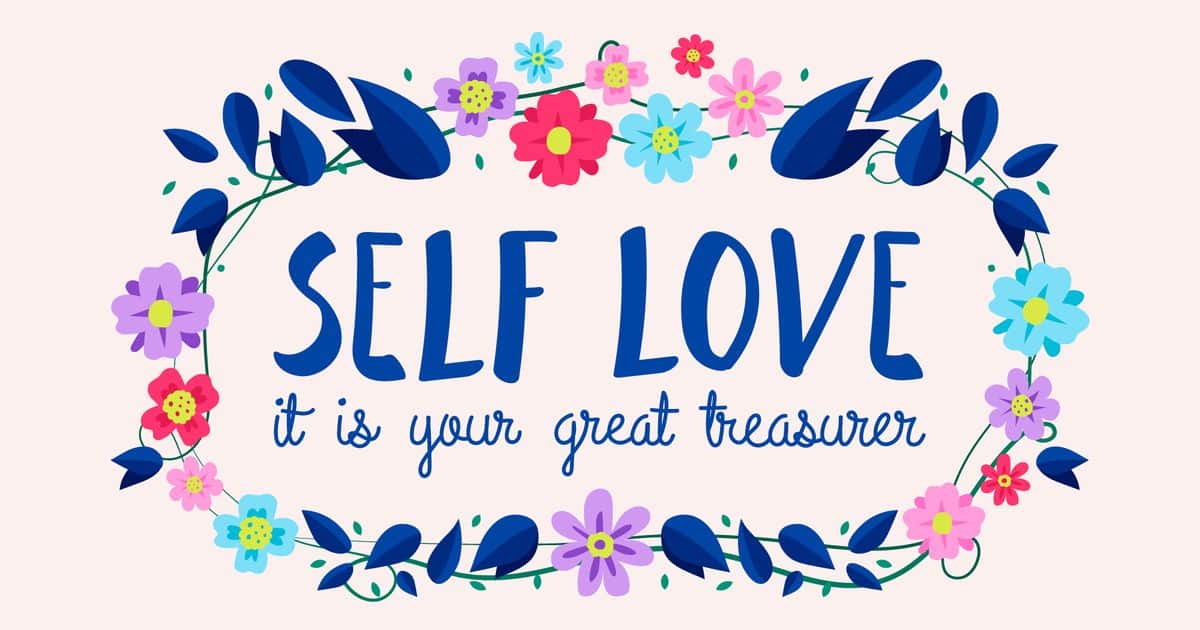Where does self-love come from?
For many of us, self-love can seem quite evasive. I struggled to be someone who could love and embrace myself completely for a long time.
The key to changing yourself and finally accepting and loving who you are?
It all begins with self-awareness, especially knowing where self-love comes from and how you can harness it to create radical change in your self-perception.
If you’re ready to begin your journey toward healing, acceptance, and radical self-love, let’s walk through the guide below together!
- Self-love originates from biological, psychological, and cultural influences and personal growth.
- Self-compassion, self-respect, and high self-esteem are essential components of self-love.
- Healthy relationships, physical health, mental well-being, and positive reinforcement promote self-love.
Table of Contents
Where Does Self-Love Come From? Origins of Self-Love

Biological and Psychological Factors
The journey of self-love begins deep within ourselves, influenced by both biological and psychological factors.
You might be surprised to learn that your capacity for self-love starts even before you are born. Research suggests that a mother’s psychological state during pregnancy can impact her baby’s development, which may affect the baby’s self-esteem and ability to love themselves as they grow older.
As you grow older, your personality traits also play a significant role in your ability to develop self-love. For men, understanding and embracing their unique personality traits can be a healthy contribution to loving themselves amidst societal expectations.
Some personality types are more prone to being self-confident and appreciative of their strengths, while others may struggle with self-doubt.
Understanding your unique personality can help you pinpoint areas of growth and build a stronger foundation for self-love.
As someone who struggled with self-doubt, insecure attachment styles, and mental health issues, I was never really attached to who I saw in the mirror.
I tended to look outside myself for external validation and believed that any form of rejection proved I wasn’t lovable or worth anything.
It wasn’t until I evaluated these negative beliefs and behaviors that I was able to identify them, challenge them, and break free.
Cultural and Societal Influences
Where does self-love come from when it’s not internal?
It turns out that cultural and societal influences also shape your ability to cultivate self-love. Different cultures hold varying beliefs around self-worth, creating diverse experiences with self-love for individuals across the globe.
Take, for example, this study on West and East German culture and how prevalent narcissism and self-esteem were in each.
Think about your own cultural background and how it may have influenced your understanding and practice of self-love.
Were you raised in a family that encouraged self-expression and individuality, or were conformity and humility prized? These values can greatly impact how easy or difficult it is for you to embrace self-love.
Societal pressures on women, in particular, can be detrimental to self-love. Issues such as body image and unrealistic beauty standards can negatively affect your ability to appreciate and truly love yourself.
Similarly, societal expectations for men, such as being stoic or not showing vulnerability, can hinder their journey to self-love. Understanding how to love yourself as a man involves breaking these stereotypes and embracing one’s emotions and vulnerabilities.
Body image was something I struggled with forever, and I developed many harmful habits as a result. Whether it was trying to eat less and binging, hyper-focusing on various aspects of myself that I deemed undesirable, and constantly talking negatively about myself.
While I couldn’t change how I grew up or what I was exposed to, I knew that I could change how I treated myself now.

Components of Self-Love

Self-Compassion
Self-compassion is a crucial aspect of self-love. It refers to the ability to treat ourselves with kindness and understanding, especially during difficult times.
Think about how you would comfort a close friend who is going through a rough patch. That’s the level of compassion you should extend toward yourself as well!
One way to practice self-compassion is to implement daily affirmations. For instance, remind yourself that it’s okay to feel upset or make mistakes, as nobody is perfect.
Another approach is to follow the teachings of psychologist Kristin Neff, who emphasizes the importance of self-kindness, common humanity, and mindfulness for developing self-compassion.

Self-Respect
In order to truly love ourselves, we must also cultivate self-respect.
This means acknowledging our inherent value and treating ourselves with dignity and consideration. When you respect yourself, you provide a set of boundaries that protect your emotional and mental well-being.
To build self-respect, it’s important to prioritize self-care.
This may involve setting aside time for activities you enjoy, surrounding yourself with positive influences, and setting realistic expectations for personal growth.
Starting out can be hard, so I took it very slowly. I began by:
- Making a list of things I wanted to do and be.
- Engaging in light exercise.
- Developing a spiritual, relaxing morning routine.
- Choosing better foods to nourish my body.
- And so on…
Once I got the hang of everything, I was able to ramp up my self-care focus to care for myself and love myself even more. Every journey starts with a single step.
Self-Esteem
Last but not least, self-esteem plays a major role in self-love.
High self-esteem elevates our feelings of self-worth and makes it easier to embrace our unique qualities.
To bolster your self-esteem, try focusing on your strengths rather than dwelling on your perceived weaknesses. It’s also helpful to surround yourself with supportive and encouraging individuals who uplift you.
I used to have a lot of toxic people in my friend group. Slowly but surely, being around those people made me feel terrible about myself.
The good news?
I finally made the decision to remove myself from those people. Without their influence, I could finally see who I was and how much value I had.

The Impact of Early Life Experiences

Importance of Nurturing Environments in Childhood
A nurturing environment during childhood plays a vital role in shaping your self-love.
As a child, when you are surrounded by love and care, you develop a strong foundation of self-worth and self-esteem.
In nurturing environments, children are encouraged to explore, take risks, and learn from their mistakes.
You might recall how exhilarating it felt when you climbed a tree for the first time, knowing that your parents were there to catch you if you fell.
These early experiences build resilience and confidence, vital ingredients of self-love.
That being said, if you were like me, you might not have had the love and support that you deserve.
It can certainly lead to us feeling like we’re not worthy of love, but that’s a belief only you can break.
The Effects of Positive Reinforcement and Encouragement From Parents
Think back to your childhood and remember how your parents’ encouraging words propelled you to put in your best effort.
When your parents praised your accomplishments or provided constructive criticism, it sent a powerful message that you were capable, talented, and worthy of love.
This positive reinforcement empowered you to face challenges head-on and instilled a sense of pride in your abilities.
Try to recall a time when your parents acknowledged your hard work or celebrated your achievements, no matter how small.
These are moments that contributed to the growth of your self-love.
But if you didn’t have that, don’t fret. You can create that for yourself right now.
Here are some practical tips I’ve used to practice positive reinforcement in my everyday life:
- Compliment yourself for your accomplishments whenever you have the opportunity.
- Acknowledge your efforts, regardless of the outcome.
- Encourage yourself to do things you’re looking to achieve, even if you’re not entirely confident.
- Keep a gratitude journal to remind yourself of your strengths and achievements.
- Celebrate when you do something amazing. You deserve it!
How Healthy Relationships and Friendships Shape Our Self-Love
Never underestimate the power of healthy relationships and friendships in cultivating self-love.
When you have supportive friends and family members who genuinely care for your well-being, it reinforces the belief that you are deserving of affection and kindness.
Think of a time when a friend’s compassionate words or a family member’s heartfelt hug helped you navigate through a difficult time.
This support system not only provides comfort and stability but also teaches you how to love yourself unconditionally.
Remember these tips to cultivate healthy relationships and enrich your self-love:
- Surround yourself with people who uplift and inspire you.
- Engage in regular conversations with loved ones.
- Seek out friends who share your values and can help you grow as a person.
- See how people respond to what you have to say. If they’re really engaged, they’re keepers!
I’ve completely changed my approach to relationships, only surrounding myself with people who actually care about me and my life. Trust me, it’s made all the difference in the world.
Other Key Factors That Contribute to Self-Love
Personal Growth
In your journey to self-love, embracing personal growth is crucial.
Setting and achieving personal goals helps boost your self-esteem and sense of accomplishment.
Take initiative and identify areas in which you want to improve, like learning new skills, overcoming fears, or expanding your social circle.
I made it a priority recently to consistently learn new skills to grow both personally and professionally. As a result, I see much more value in myself and am far more confident when approaching certain tasks.

Physical Health
Taking care of your physical health plays a significant role in fostering self-love. If you neglect yourself, you really reinforce the negative belief that no one cares, even you.
Engage in regular exercise, eat well-balanced meals, and tend to your personal hygiene. By treating your body with kindness and respect, you’ll feel energized, confident, and more capable of tackling life’s challenges.
That being said, I recognize and appreciate how difficult change can be.
Push too little, and it becomes easy to slip back into old habits. Push too hard, and you may burn yourself out and turn to something more familiar.
I started by making minor changes and incorporating bigger ones once I was more comfortable with this new routine.
Some helpful ways I began my self-love and self-care journey included:
- Doing 30 minutes of physical activity daily (it can be light or intense).
- Drinking at least 2 liters of water.
- Making sure to get enough sleep.
- Consuming nutritious whole foods and avoiding processed foods.
- Using tools like deep breathing and meditation to feel more grounded and balanced.
These habits will make a noticeable difference in your overall health and attitude, allowing self-love to flourish.
Don’t be afraid to do further research and find ones that might be more relevant to you.
Mental Health
Your mental health is just as important as your physical health when cultivating self-love.
Self-love and self-compassion are vital for mental health and well-being, as they help prevent depression and anxiety.
Adopt strategies to manage stress, stay in the present moment, and practice gratitude. Meditation and mindfulness techniques, for example, can assist in combating negative thoughts and fostering a positive outlook.
With that in mind, you might need some extra help.
For the bulk of my life, I’ve struggled with anxiety and depression. Mental disorders can make it extremely difficult to love yourself as you have something that is actively turning you against yourself.

Positive Relationships
Surrounding yourself with a network of supportive and loving people is essential for self-love.
These relationships provide a sense of belonging and serve as a foundation for personal growth.
Positive connections also offer emotional support during challenging times, reminding you of your worth, encouraging your aspirations, and celebrating your successes.
Think about the relationships in your life and assess their impact on your self-love journey.
Are they nurturing or hindering your growth? Take the initiative to build meaningful connections with people who uplift and inspire you, and distance yourself from toxic or negative influences.
When Is the Last Time You Felt Loved?
More importantly, when was the last time you took the time to love yourself?
Self-love is hard. But once you know where self-love comes from and how to cultivate it, it’s more than possible to give yourself the attention, care, and compassion you deserve.
When you’re ready, all of the tips above will be there for you to help you make the changes you need to transform the way you see yourself!
Frequently Asked Questions
What are the key components of self-love?
Self-love is composed of self-compassion, self-respect, and self-esteem. These elements help you appreciate your worth.
How can I develop self-love?
You can develop self-love by practicing self-care, setting personal growth goals, nurturing healthy relationships, and seeking professional help if needed.
How do biological and psychological factors affect self-love?
They influence your capacity for self-love. Your personality traits and your mother’s psychological state during pregnancy can impact self-love.
How does my cultural background affect self-love?
Different cultures hold varied beliefs about self-worth. Your cultural upbringing may influence your self-perception and practice of self-love.
What role does personal growth play in self-love?
Personal growth boosts your self-esteem and sense of accomplishment. Setting and achieving personal goals helps you value and love yourself more.


